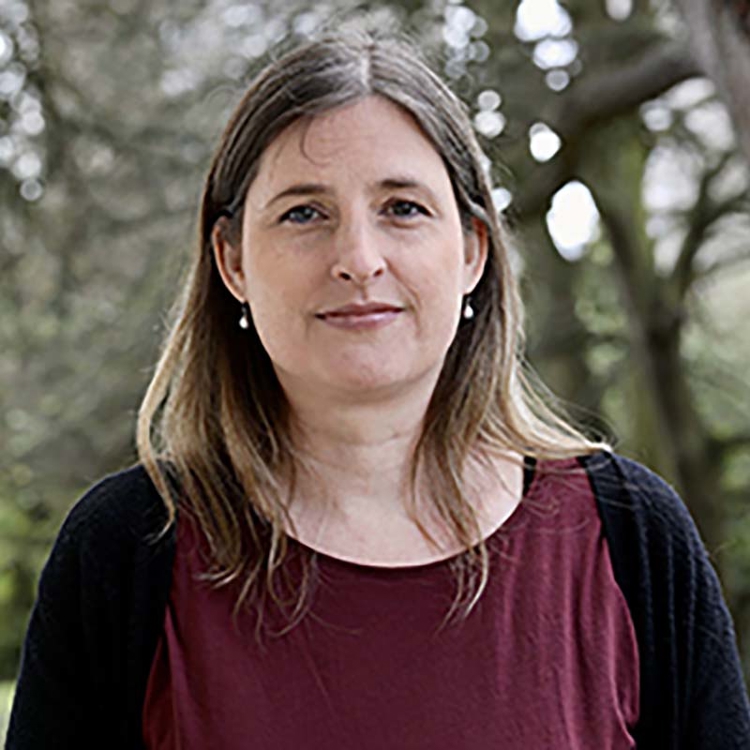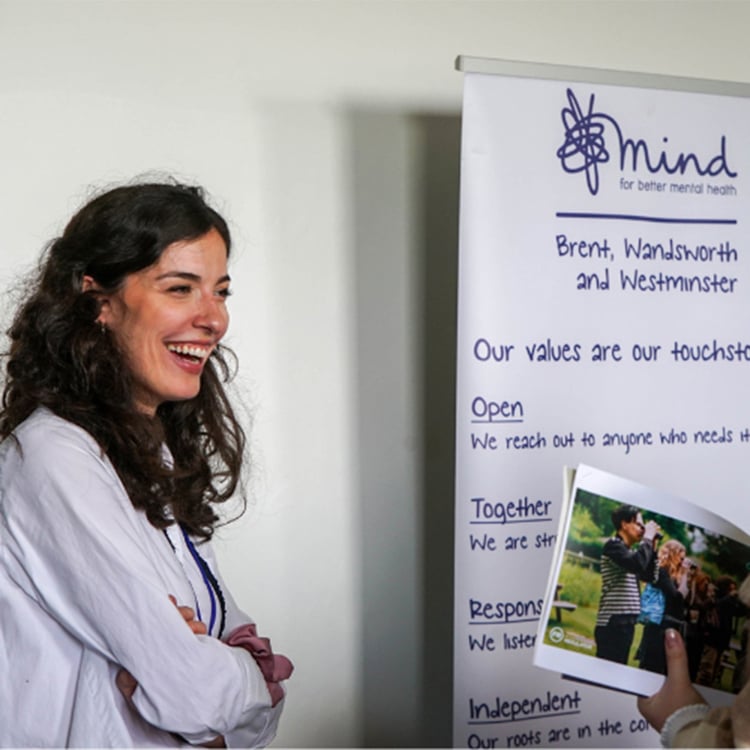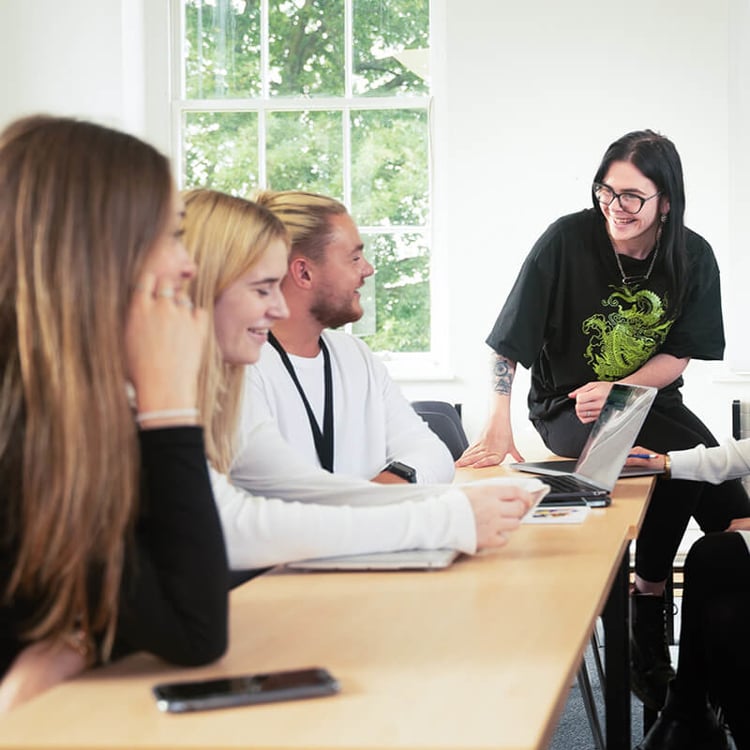/ Undergraduate /
Start date:
September 2025
You'll need:
112–128 UCAS points (or equivalent)
Foundation Year: 64–80 UCAS points (or equivalent)
UCAS code:
C845
C846 (if choosing Foundation Year)

On-Campus Open Day
Saturday 12 July 2025
Discover how the mind works and its impact on behaviour, while developing practical counselling skills and an understanding of how different therapeutic approaches can have a positive impact on people’s lives.
Did you know?
Roehampton has an international reputation for counselling and therapeutic training.
Top 6 in London for Counselling & Psychotherapy
(Complete University Guide 2025)

Silver in the 2023 Teaching Excellence Framework (TEF)
For delivering high quality teaching, learning and outcomes for our students.

#8 in England for undergraduate student satisfaction
National Student Survey 2024

Modules
Modules Details: This module provides an opportunity to maximise your success within and beyond your degree. Through interactive lectures and seminars, you will explore topics that prepare you for university, postgraduate study, and the workplace. Sessions address procrastination, time management, and anxiety, helping you reach your full potential. You will develop research and reporting skills essential for psychology and related fields. The module also explores artificial intelligence (AI), emphasising its role alongside human intelligence. Additionally, you will identify and develop key skills, gaining insight into future career opportunities and professional growth, empowering you to excel in your chosen path.
How you’ll learn: You will be taught through a mixture of lectures and seminars. Lectures will cover key information and concepts to support your personal development. The seminars offer hands-on opportunities to apply lecture concepts in practice. You'll work independently and with peers to develop skills such as resource finding, debating, analysing, and presenting. You will also learn to use AI critically, ethically, and creatively—for example, for feedback, discussing complex ideas, and interview practice. This will help deepen your understanding while identifying AI’s limitations. Seminar activities will also support your assessments, enhancing your ability to engage with AI effectively and refine your academic skills.
Assessment: The assessments provide engaging ways to showcase your skills and understanding. You will be evaluated through a presentation, a critical debate, and a reflection. These tasks will enhance your ability to communicate clearly, present information effectively, and write persuasively. You will also develop skills in using AI for critical debate and reflection. These assessments will strengthen key abilities essential for your degree, postgraduate studies, and many workplaces, preparing you for future academic and professional success.
Module details: In this module, you will explore the foundations of psychology, gaining essential knowledge for your degree. You will study historical perspectives and key areas, including cognitive psychology, which examines mental processes; biological psychology, which links biology and behaviour; developmental psychology, which explores human growth; and social psychology, which investigates social influences. You will also consider individual differences. By integrating these perspectives, you will develop a well-rounded understanding of psychology and essential research methods, preparing you for further study and careers in related fields.
How you'll learn: You will be taught through lectures and seminars. Lectures provide an overview of each topic, highlighting psychology's contributions and applications. Seminars, linked to lectures, offer interactive engagement through discussions, debates, and quizzes. Activities may include applying concepts to real-world issues and research practical's illustrating psychological methods and data interpretation. Each seminar is tailored to its topic while supporting assessments. This approach ensures a dynamic learning experience, deepening your understanding of psychology in practical contexts.
Assessment: Assessment for this module includes a poster and a portfolio, helping you develop research, presentation, and written communication skills. You will enhance your ability to summarise information, evaluate material, and think analytically. These skills are essential for your degree, postgraduate studies, and are highly valued by employers.
Module details: This module introduces research approaches and data analysis methods used in psychology and related fields. You will learn to develop research questions and analyse data using both quantitative and qualitative methods. Quantitative analysis includes statistical techniques to describe data and explore relationships, while qualitative methods focus on identifying themes in text or interviews. This knowledge is essential for your degree, particularly for further data analysis and your final-year research project, as well as for postgraduate study and workplace applications.
How you'll learn: This module combines lectures and workshops to develop your understanding of research approaches and data analysis. Lectures will introduce key concepts and theories, while workshops provide hands-on experience in developing research questions, designing studies, and analysing data. You will also learn to use various software packages for data analysis. These interactive workshops will reinforce lecture content and support your assessments, ensuring you gain practical skills essential for conducting research throughout your degree and in future academic or professional settings.
Assessment: In this module, you will be assessed through a poster on a specific research question and a portfolio including tasks such as a literature review and research write-ups. These assessments will develop your research, data analysis, written communication, and presentation design skills, which are essential for your degree, postgraduate studies, and are highly valued by employers, enhancing your employability.
Module details: This module equips you with both theoretical understanding and practical counselling skills, focusing on core competencies such as active listening, empathy, ethical decision-making, and self-awareness. You'll explore frameworks like Kolb’s Experiential Learning Model and Gibbs' Reflective Cycle, gaining insights into the principles of counselling. Key topics include boundary-setting, confidentiality, the therapeutic alliance, and ethical considerations. The module also addresses complex dynamics such as transference, countertransference, and emotion regulation, with experiential exercises to enhance self-awareness and therapeutic engagement.
How you'll learn: You will develop your counselling skills through workshops, seminars, and tutorials, engaging in role-play scenarios and experiential exercises in triad groups. This practical approach allows you to practice skills such as active listening, paraphrasing, and non-verbal communication. Self-reflection and peer feedback will be encouraged through journaling and structured activities, helping you understand your relational styles. Continuous feedback will support your growth, enabling you to refine your ability to engage effectively in professional, therapeutic relationships.
Assessment: Assessments include a Therapeutic Session Analysis, where you will evaluate a recorded counselling session to apply person-centred therapy concepts, and a Reflective Essay, focusing on personal growth and skill development. Formative assessments and tasks in seminars will help reinforce learning and improve your practice. These assessments are designed to deepen your understanding of counselling skills and reflective practice, preparing you for professional work in clinical and therapeutic settings. Feedback will guide you in honing your proficiency and setting future goals.
These modules are those we currently offer and may be subject to change.
Module details: This module will develop your knowledge of key areas in psychology, including social psychology, developmental psychology, and individual differences. You will explore how social influences shape thoughts and behaviours, how cognitive, social, and emotional development occurs across the lifespan, and how individuals differ in these processes. By evaluating different explanations for human behaviour, you will consider real-life applications, such as the impact of social media, peer influences, neurodiversity, and identity formation. This knowledge is essential for further study on social and developmental psychology and is valuable for careers in education, healthcare, social care, and community settings.
How you'll learn: This module is delivered through lectures and seminars, covering conceptual, theoretical, cultural, and historical perspectives on behaviour, identity, and individual differences. Lectures will link content to current affairs, while seminars will include interactive activities such as quizzes, discussions, and practical research exercises. You will explore real-world applications, such as identity formation and intelligence testing, while developing teamwork and self-reflection skills. These transferable skills will benefit various career paths, and seminar activities will also support you in preparing for assessments.
Assessment: You will be assessed through a poster and a portfolio, which will enhance your skills in presentation design, communication, and the ability to summarise, synthesise, evaluate, and apply psychological knowledge. These skills are essential for further study and postgraduate education, as well as highly valued by employers, supporting your future career development.
Module details: In this module, you will explore the fundamental processes underlying human cognition and the relationship between physiological functions and mental processes. Key topics include learning, perception, attention, memory, and language, alongside the neurobiological basis of psychological experiences. Using current neuroscience research, you will develop an understanding of how biological factors influence cognition. Through theoretical study and empirical research, you will gain essential knowledge for further study, postgraduate education, and careers in psychology, neuroscience, and related fields, enhancing your academic and professional development.
How you'll learn: In this module, lectures and seminars will explore conceptual, historical, and contemporary ideas in cognitive and biological psychology. Lectures will cover key concepts and theories relating to topics in cognition and neuroscience. Seminars will include practical activities to apply theories from lectures and provide support for assessments, encouraging critical engagement with the material.
Assessment: In this module, you will be assessed through a presentation and a portfolio, enabling you to further develop skills in effective communication, critical handling of materials, and scientific reasoning to explore alternative approaches and solutions—key competencies for your future studies and employment.
Module details: In this module, you will expand your understanding of research approaches and data analysis methods in pPsychology and related fields. You will develop skills in advanced quantitative and qualitative analysis, including ANOVAs, regression, psychometrics, and qualitative methods like interpretative phenomenological analysis (IPA) and discourse analysis. This knowledge will be essential for your degree, particularly your independent research project in Year 3. More broadly, mastering research methods will enhance your ability to evaluate evidence throughout your studies. These skills are also highly valuable for postgraduate study and a wide range of careers that require data analysis and critical thinking.
How you'll learn: This module will be delivered through a combination of lectures and workshops, with lectures covering key concepts and theories in data analysis. In workshops, you will apply this knowledge by developing and conducting research studies, analysing data, and engaging in activities that support your assessments.
Assessment: You will be assessed through a qualitative and a quantitative research report, where you will describe the study's background and methods, analyse a dataset, and interpret the findings in the context of existing research. These assessments will enhance your research, data analysis, and written communication skills, which are essential for your degree, postgraduate studies, and a wide range of careers.
Module details: This module aims to enhance your mental health literacy by providing a comprehensive overview of theoretical models that explore human distress. It will help you understand emotional and psychological struggles, extending beyond clinical disorders. You will learn to differentiate between models of care and cure, emphasising the continuum between distressing experiences and clinical conditions. For example, you will examine how anxiety differs from Generalised Anxiety Disorder (GAD). This understanding will enable you to address psychological distress effectively, applying a nuanced approach to mental health care, essential for clinical, counselling, and psychotherapy professions.
How you’ll learn: Throughout this course, you will explore key theoretical models of mental health, including biomedical, psychodynamic, humanistic, cognitive, and psychoneuroimmunological approaches, with a historical perspective on their evolution across different populations. You will learn how each model conceptualises various forms of psychological distress, including stress, anxiety, and trauma. The module will also cover the distinction between normal distress and clinical disorders like PTSD and Generalised Anxiety Disorder (GAD). You will examine the impact of early adverse experiences on emotional regulation and attachment, and gain insights into the psychoneuroimmunological model, which integrates psychological processes with biological systems.
Assessment: The assessments for this module are innovative and based on peer review strategies to enhance learning outcomes. The first assessment involves exchanging a patchwork text with peers, covering a historical discussion, model conceptualisation, and counselling strategies for a chosen psychological distress. You will provide written feedback, which will be evaluated for quality and critical analysis. This feedback session prepares you for the second assessment, a comprehensive portfolio requiring critical examination of psychological distress from an intercultural perspective. Both assessments develop your analytical skills and offer opportunities for in-depth reflection and knowledge integration.
These modules are those we currently offer and may be subject to change.
This course offers all students the option of a one-year paid work placement, to boost your employability even further. If you choose this route, you will take the placement following year two of your course, and then return to complete your degree.
Why take a placement?
A placement year is the perfect opportunity to gain valuable work experience, to build on the career skills we will teach you on this degree. The connections you make on the placement will improve your career prospects further, and equip you with the skills you need to secure graduate-level employment.
How we support you
The University's Placement and Work Experience Team are experts at helping you to secure a placement. They will work closely with you from the start, helping you research potential employers, discover placement opportunities, create and pitch your CV, and will coach you to perform well in interviews. We aren't able to guarantee a placement, but our sector-leading advisors will give you the best possible chance of securing one.
Find out more about how we'll support you
We understand that your plans might change once you start your programme. If you decide not to do a placement, you will have the option of completing the three year version of your programme.
Whatever your choice, you will have access to many opportunities for work experience through our Placement and Work Experience Team, and access to face-to-face and 24/7 online careers support.
Module details: In this module, you will explore the concept of mental disorders within clinical psychology. You will critically examine various conceptualisations of normality, and the criteria used to distinguish mental health conditions from disorders. The module covers how psychiatry has historically defined the boundary between normal and abnormal behaviour, using tools like the DSM and ICD. Each session will focus on a specific disorder category, such as Anxiety, Depressive, and Personality Disorders. You will learn to recognise symptoms, use differential diagnosis, and consider socio-demographic factors in clinical assessments. The module will also introduce various assessment methods, such as questionnaires and neuropsychological tools, and teach you how to formulate clinical reports for use with patients and multidisciplinary teams.
How you’ll learn: In seminars, you will be trained in clinical interviews based on various theories and apply structured assessment methods, such as checklists, questionnaires, and neuropsychological tools, through role play. You will explore the advantages and limitations of each method and learn to choose the most effective approach for different assessments. Using video content, testimonies, and reports, you will identify key clinical elements relevant to assessment. You will also work on differential diagnosis and case formulation as formative tasks to support your development as an effective psychologist.
Assessment: The module combines theoretical knowledge with practical application through innovative assessments. In the first task, you will critically analyse the overlap and distinctions between two mental disorders, working in pairs to provide critiques and debates on differential diagnosis. You will choose between a video or written assessment, promoting inclusive learning. Formative feedback will support your progress towards the second task, where you will complete a clinical formulation, applying your skills to establish a differential diagnosis and prevention strategies, preparing you for a career in clinical or counselling psychology.
Module details: In this module, you will explore the dynamics of mental health care across various clinical and counselling settings, focusing on intervention strategies tailored to underrepresented communities. The module highlights the importance of creativity in therapeutic practices and the need for professional diversity in mental health. You will examine different therapeutic approaches for diverse populations, including children, adolescents, adults, and the elderly, while considering settings such as perinatal care and community-based interventions. This module prepares you to apply a wide range of skills and concepts in your future professional practice.
How you’ll learn: In this module, you will engage in a variety of learning activities designed to enhance your understanding and practical skills in clinical and counselling psychology. These include lectures, group discussions, and workshops focused on specific communities. You will explore real-world case studies to understand the complexities of working with diverse populations and settings. Practical exercises, role-playing, and reflective journaling will help you apply theoretical knowledge to real-life situations, fostering a holistic approach to mental health care and supporting your development through portfolio work.
Assessment: The assessments for this module are designed to provide real-world application and professional engagement. The Mental Health Worker Interview involves interacting with a mental health professional, offering insights into the field and helping you develop critical thinking, communication, and analytical skills. The Intervention Plan assessment requires you to create a hypothetical client scenario and design a comprehensive treatment strategy, promoting creativity and problem-solving. Formative feedback throughout the module will support your skills development, helping you gain a deeper understanding of clinical and counselling practices, such as treatment goals and risk assessments.
Module details: In this module, you will apply your knowledge of psychological research methods and data analysis to design, conduct, and report on an independent research project. You will formulate research questions, collect and analyse data, and interpret your findings in the context of existing literature, considering their implications. The available projects will cover various areas of psychology, allowing you to choose a topic of personal interest. The skills gained in planning, executing, and reviewing research are valuable for postgraduate studies and many careers.
How you'll learn: You will be supported by a supervisor with expertise in your chosen topic area, meeting regularly, typically in small groups. In addition to these meetings, lectures and workshops will help develop your research skills and support your work for the module, with lectures covering report-writing and data analysis methods, and workshops offering opportunities to apply these concepts to your own project. These sessions will provide valuable support for your assessments throughout the year.
Assessment: Whichever project you choose, you will need to write a project report and deliver a poster presentation, helping to develop your written and oral communication skills. Throughout the module, your work will also enhance your research and project management abilities, equipping you with a range of transferable skills that are valuable for postgraduate studies and various graduate careers.
Module details: This module focuses on your personal and professional development, preparing you for a career in clinical, counselling, and psychotherapeutic settings. It provides practical knowledge and skills needed to navigate professional structures, hierarchies, and workplace dynamics within UK mental health settings. You will develop strategies for effective collaboration in multidisciplinary environments and complete a minimum of 30 hours of voluntary experience in a mental health setting to boost employability. The module is open to various roles, ensuring experience in a helping relationship within mental health contexts.
How you’ll learn: In this module, you'll engage in both theoretical and practical learning to enhance your skills as a mental health professional. Through a combination of seminars, workshops, and online training, you’ll develop essential skills such as effective communication, leadership, and ethical decision-making. You’ll also explore different professional structures and settings in mental health, including NHS, private practice, and community centres. The module includes a voluntary placement where you can apply your learning in real-world contexts, gaining hands-on experience and reflecting on your interpersonal skills and workplace dynamics.
Assessment: Your learning will be assessed through a professional development portfolio, where you will document key skills and experiences essential for a successful mental health career. Regular formative assessments during seminars will support this process. The second assessment involves a reflective journal documenting your voluntary work in a mental health setting, including critical reflections on your personal and professional growth. You will also explore a key moment in your placement, enhancing your self-awareness and your ability to make sound ethical decisions in practice.
These modules are those we currently offer and may be subject to change.
This course offers a foundation year, which takes place at the beginning of your studies. Studying a foundation year will give you academic and practical experience, and a strong introduction to your subject, ensuring you succeed on your undergraduate degree.
30 credits
You will develop your core academic and integrated English language skills of speaking, listening, reading and writing. You will become familiar with key academic skills and concepts, such as referencing methods and awareness of academic integrity and tone. You will apply these skills and knowledge to both broad topics and also your chosen subject pathway.
Teaching and learning
You will be required to actively engage in on-campus learning for up to 10 hours a week.
You will be taught through a full range of teaching and learning methods, which include lectures, seminars, workshops, discussion groups, group directed tasks and presentations. This will enable you to learn from your peers and tutors in both structured and information settings.
You will be encouraged to think creatively about your approach to learning and discussions with your peers. You will also have access to recordings, resources, links and signposting through Moodle to enrich your learning.
Assessment
You will be assessed through group and individual presentations, comparative and reflective essays, multiple choice exams, coursework and reports, oral exams, portfolios, case studies and blogs.
30 credits
You will develop your research, numeracy and information technology skills. You will investigate the difference between primary and secondary research, conduct your own research project and demonstrate your findings through data analysis. You will also develop your awareness of equality, diversion and inclusion in the UK, through a real-world issue; discrimination in the workplace.
Teaching and learning
You will be required to actively engage in on-campus learning for up to 10 hours a week.
You will be taught through a full range of teaching and learning methods, which include lectures, seminars, workshops, discussion groups, group directed tasks and presentations. This will enable you to learn from your peers and tutors in both structured and information settings.
You will be encouraged to think creatively about your approach to learning and discussions with your peers. You will also have access to recordings, resources, links and signposting through Moodle to enrich your learning.
Assessment
You will be assessed through group and individual presentations, comparative and reflective essays, multiple choice exams, coursework and reports, oral exams, portfolios, case studies and blogs.
30 credits
This module focuses on an in-depth exploration of applied psychology, drawing on foundational theories and models that explain human behaviour. You will engage with the issues and debates around some of the core psychological concepts, such as prejudice, stereotyping, group dynamics, and conformity, gaining a broad understanding of what influences human behaviours.
The module introduces the bio-psycho-social model within health psychology, providing a holistic framework for understanding health-related behaviours. You will gain a knowledge of how different psychological theories and models can be applied to understand the development of risky health behaviours and can be applied to design effective health intervention strategies.
You will learn the skill of collaborative group work, which is an integral part of the module, encouraging you to apply your knowledge of psychological theories to analyse and present a case study on risky health behaviour. You will also develop the skill of critical analysis, integrating various theories and models in psychology to explain risky health behaviour and suggest intervention programs.
Teaching and learning
The teaching delivery for each module consists of one, one-three-hour lecture and one, two-hour seminar per week. You will learn through a blend of lectures and interactive sessions, case studies and group presentations.
There will be an additional 30 minutes of online support per week. This will consist of individual tasks such as quizzes, posting on discussion forums, watching videos and taking notes, and reading articles or chapters.
Assessment
This module will be assessed using a written assessment and a group presentation.
50% - written assessment, composed of two parts; essay and self-reflection. You will write an essay on your knowledge of at least two psychological theories or models to explain why people develop risky health behaviours and propose and evaluate intervention strategies. You will reflect on your experience and learning journey as you prepared for and wrote the essay.
50% - group presentation, where you will apply knowledge from psychology theories to plan health interventions on risky health behaviour.
30 credits
This module focuses on the different perspectives available in psychology to explain human behaviour.
You will get the opportunity to explore methods of scientific thinking and reasoning within a Psychology context in an enquiry-based way. Problem-based learning and blended learning (combines online and face-to-face time) approaches will facilitate deep, experiential learning.
You will gain knowledge on what scientific thinking is, how to distinguish this from pseudoscience and how the scientific cycle enquiry can be applied to the various perspectives in psychology.
You will be encouraged to explore how different perspective in psychology can explain human behaviour, scientific argumentation and ethical working practices in relation to current scientific topics as reflected in news reports, recent academic publications and historical case studies. You’ll gain the skill of critical thinking and how to apply concepts from psychology to explain everyday behaviour, as well as poster presentation and public speaking.
Teaching and learning
The teaching delivery for each module consists of one, one-three-hour lecture and one, two-hour seminar per week. Lectures will introduce the scientific basis of knowledge and research methodologies in the context of Psychology and empower you to distinguish between science and pseudoscience, while seminars will consist of individual and group activities on the weekly topics.
There will be an additional 30 minutes of online support per week. This will consist of individual tasks such as quizzes, posting on discussion forums, watching videos and taking notes, and reading articles or chapters.
Assessment
This module will be assessed using a group poster presentation and written assessment.
40% - group poster presentation, you will compare and contrast any two perspectives on psychology.
60% - written assessment, you will write a critical essay on how pseudoscience differs from science.
These modules are those we currently offer and may be subject to change.
Foundation Year
This course can also be studied with a foundation year (September entry only).
Our suite of Psychology programmes has a strong history of accreditation and has consistently been commended for our high-quality education and outstanding student experience by the British Psychological Society (BPS).
Following a recent review and enhancement, this programme has been carefully redesigned to continue meeting all BPS accreditation standards and is currently pending reaccreditation by the BPS in early spring 2025.

Skills
This exciting course combines core psychology and clinical psychology, alongside practical counselling skills.
The skills you'll develop include:
- Specialised skills essential to counselling and psychological therapies, including communication, active listening, paraphrasing and reflecting
- An understanding of the key aspects of what it is to be human - how we differ, how our childhood can impact our adulthood, and how we can be influenced
- Advanced research skills, including project management, data management and analysis.
This integration of the scientific understanding of the mind combined with an in-depth knowledge of counselling, psychotherapy and clinical psychology will give you a unique, expert ability to apply psychology to the real world.
When you graduate, you’ll be in an excellent position to pursue postgraduate training in Clinical Psychology or counselling and psychotherapy, or you can use the skills and expertise you’ve gained to succeed in a wide range of professions.
Our modules will teach you:
- how we process information, communicate, learn, and remember
- how our biology and the society we live in influences us across our lifetimes
- the different models of therapy, including cognitive behavioural therapy (CBT) and humanistic approaches, and learn how they are used in different settings, such as the NHS, and with different types of people
- about our mental health, and the impact of factors such as anxiety, stress, depression, and trauma.
You can also gain additional qualifications throughout your degree, such as a certificate in Mental Health First Aid, to give you a head start in your career.
Learning
Learn in a supportive enviornment with an international reputation for psychological training.
At least 50% of your teaching will be in seminars, lab classes or workshops, giving you tailored teaching and contact time with your lecturers.
You’ll be taught by leading psychologists and counselling experts and practitioners, who bring their real-life experience into the classroom. Lean the factors involved in counselling and therapy, and the reflective skills used in professional practice.
You will also have the opportunity to become a Mental Health England First-Aider, or train and develop skills in mental health first aid, further expanding your professional development.
We are a community, and our student support is second to none, with BPS commendations for excellence. Whatever your personal circumstances or ambitions, we’re here to help you realise your full potential. Some of the support we offer includes:
- Academic Guidance Tutors: you’ll be allocated an experienced Academic Guidance Tutor to support you through your studies, help you pick your modules, and provide career advice.
- Student feedback and consultation hours: lecturers have drop-in office hours when you can go to them directly, arrange a video call or email to ask questions.
- Study skills for psychology: these are weekly sessions for all students who want to improve their academic writing, achieve better essay grades, overcome exam anxieties, develop further employability skills, and achieve their goals.
- Revision support: our lectures are delivered on-campus, but recordings are made available to support your revision.
- RoeBuddies: all first-year students are connected to a second or third-year student mentor who offers advice and support.
- Study skills support: as higher education is different from school and college, our Academic Achievement Advisers are here to help you develop the skills you need at university and beyond.
- Welcoming community: when you join Roehampton’s School of Psychology, you become part of an inclusive community of students and academics. You can also join the Roehampton Psychology Society to connect with your peers and enjoy a varied programme of events, talks, debates and socials.

Dr Maria Gudbrandsen
Maria has a BSc in Psychology from the University of Roehampton, as well as MSc in Psychiatric Research, and a PhD in Clinical Neuroscience from the Institute of Psychiatry, Psychology and Neuroscience (KCL).
Maria is Head of Year 1 for BSc Psychology, and teach across all the BSc Psychology programmes in topics of developmental psychology, neurodevelopmental disorders, and some educational and clinical psychology. She also contributes to to the MSc Applied Cognitive Neuroscience, with a specialty in structural MRI and analysis.
Maria is also conducting her own research at the university, primarily in 22q11.2 deletions syndrome, autism and mental health.

Dr Paul Dickerson
I’m Paul Dickerson, I’m a Principal Teaching Fellow and I started at Roehampton way back in 1991! Even though I have been at the University for nearly 30 years each year still feels fresh. I teach across multiple modules and programmes with a particular interest in qualitative research and social psychology and I want to enthuse everyone about this amazing subject. I love sharing my passion for psychology in all of my teaching and writing and – but don’t tell anyone – I do sometimes share a song I have written for the students that I teach. I have a particular interest in helping you to reach your full potential and I run weekly lunchtime sessions to help with this – use this link https://study.sagepub.com/psychologybrilliantessays to find out about the sorts of things covered. I hope that I will have the opportunity to help you enjoy this wonderful subject as much as I have.

Nichole Proia
I’m Nicole and am a senior lecturer, and I also teach on the Dramatherapy master’s. Although I’ve worked here for 12 years, the reflective and experiential workshops where students delve into their personal process to discover the richness of their inner worlds, still remain the highlight of my week. There are tears and laughter, surprise and adventure, all of which keeps me on my toes and ever curious about each student I meet! I am particularly interested in working with the body in therapy, and holistic approaches to mental and physical well-being. Much of my research focuses on looking at ways in which the body communicates historical trauma and the transformational healing potential of somatic awareness and the reconnection and alignment of mind and body. Use of the beautiful grounds of Roehampton feature in some of our sessions and it gives me such joy to share the natural setting with students as they explore and learn.

Dr Marco Sandrini
Hi, I am Marco! I have been at Roehampton since 2015. I graduated in Experimental Psychology at the University of Padua (Italy). I then obtained a PhD in Neuroscience at the University of Verona (Italy) and undertook a two-year post-doctoral fellowship at the Centre for Mind/Brain Sciences (University of Trento, Italy) and spent five-years as a research fellow at the National Institutes of Health (USA), the largest biomedical research agency in the world.
The focus of my research is interventions to enhance memory in aging and reduce the frequency of intrusive memories of trauma using the combination of neuroimaging and non-invasive brain stimulation.
I am primarily involved in the teaching of research methods and statistics and cognitive neuroscience. I am the module convenor for the second year undergraduate module “Psychological Research: Design, Analysis and Impact” and “Use of Cognitive Neuroscience Techniques” for the master in Applied Cognitive Neuroscience

Assessment
Your assessments reflect the real-world of psychology, preparing you for your future.
There are very few formal examinations or essays on our BSc Psychology (Clinical and Mental Health). Instead, your assessments will include portfolios, case studies, intervention reports and psychological research.
Between Years 2 and 3, you can also opt for a professional placement year, meaning you have the opportunity to apply for a placement and gain valuable real-world experience.
Career
As this programme combines core psychology with Clinical Psychology, it is unique in giving you the opportunity to pursue multiple career paths depending on your ambitions after graduation.
Your future role could be:
- Clinical, counselling or educational psychologist
- Psychotherapist
- Social Worker
- Mental health support worker

Open days
Get a real taste of our campus, community and what it’s like to study at Roehampton
Applying
Full-time UK undergraduate students apply through UCAS.
Course subject to curriculum enhancement and revalidation.
Entry tariff
112–128 UCAS points (or equivalent)
Foundation Year: 64–80 UCAS points (or equivalent)
Looking to work out your UCAS points or find out about our entry requirements? Find out more.
When we consider applications to study with us, we form a complete view of your achievements to date, and future potential, and can offer flexibility in entry requirements. Find out more about our Contextual Offer scheme.
Specific entry requirements
GCSE requirement: Maths, Grade C.
General entry requirements
September 2025 entry tuition fees
UK (home) tuition fees
Undergraduate degree: £9,535
Foundation Year: £9,535
We offer a wide range of scholarships and bursaries. See our financial support pages for UK students.
We also provide other ways to support the cost of living, including free buses and on-campus car parking, hardship support and some of the most affordable student accommodation and catering in London. Find out more about how we can support you.
Additional costs to consider
Travelling to and from work experience may require some additional expenses.
Some work experience may require students an enhanced DBS check.
International undergraduate students apply through our direct application system.
Course subject to curriculum enhancement and revalidation.
Entry tariff
112–128 UCAS points (or equivalent)
Foundation Year: 64–80 UCAS points (or equivalent)
Looking to work out your UCAS points or find out about our entry requirements? Find out more.
When we consider applications to study with us, we form a complete view of your achievements to date, and future potential, and can offer flexibility in entry requirements. Find out more about our Contextual Offer scheme.
Specific entry requirements
GCSE requirement: Maths, Grade C/ 4 (or equivalent)
General entry requirements
September 2025 entry tuition fees
EU and international tuition fees
Undergraduate degree: £16,950
Foundation Year: £16,950
International Foundation Pathway: £16,950
We offer a wide range of scholarships and bursaries. See our financial support pages for international students.
We also provide other ways to support the cost of living, including free buses and on-campus car parking, hardship support and some of the most affordable student accommodation and catering in London. Find out more about how we can support you.
Additional costs to consider
Travelling to and from work experience may require some additional expenses.
Some work experience may require students an enhanced DBS check.






